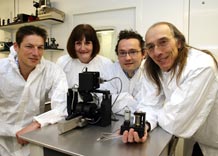
Left to Right: Dr Luke Savage, Dr Lesley Wears, Dr Raphael Matelon, Professor Dave Newman.
University of Exeter receives $100,000 Grand Challenges Explorations Grant for malaria research
The University of Exeter has received a US$100,000 Grand Challenges Explorations grant from the Bill & Melinda Gates Foundation.
The grant will support an innovative global health research project, which could help tackle one of the world’s biggest killers – malaria.
This project is one of 81 grants announced by the Gates Foundation in the second funding round of Grand Challenges Explorations, an initiative to help scientists around the world explore bold and largely unproven ways to improve health in developing countries. The grants were provided to scientists in 17 countries on six continents.
To receive funding, the research team showed in a two-page application how their idea falls outside current scientific paradigms and might lead to significant advances in global health. The initiative is highly competitive, receiving more than 3,000 proposals in this round.
A team from the University’s School of Engineering, Computing and Mathematics will use the grant to develop a new device to diagnose malaria. The researchers have developed the first new technique for diagnosing malaria able to challenge the rapid diagnostic tests (RDTs) currently used in the field. Early results suggest that the technique could be as effective as RDTs but far faster and cheaper, making it a potentially viable alternative. Professor Dave Newman, Dr Luke Savage, Dr Raphael Matelon and Dr Lesley Wears will now build on this work to develop a small, portable device that could be used in rural areas in developing countries.
The technique uses magneto-optic technology (MOT) to detect haemozoin, a waste product of the malarial parasite, in the blood. Haemozoin crystals are weakly magnetic and have a distinct rectangular form. They also exhibit optical dichroism, which means that they absorb light more strongly along their length than across their width. When aligned by a magnetic field they behave like a weak Polaroid© sheet such as used in sunglasses. This new technology takes advantage of these properties to give a precise reading of the presence of haemozoin in a small blood sample. The team has created a device, which gives a positive or negative reading for malaria in less than a minute.
Professor Dave Newman said: ”We are absolutely thrilled to have received this grant from the Gates Foundation. There is an urgent need for a new diagnostic technique for malaria, particularly in the light of global warming, which threatens to spread the disease into new parts of the world, including southern Europe. The early results from our device are very promising and hugely exciting. By winning this grant, we can build on this and ultimately produce a sensitive non-invasive device that will be cost effective and easy to use, making it suitable for developing countries, where the need is greatest”
“The winners of these grants are doing truly exciting and innovative work,” said Dr. Tachi Yamada, president of the Gates Foundation’s Global Health Program. “I’m optimistic that some of these exploratory projects will lead to life-saving breakthroughs for people in the world’s poorest countries.”
About Grand Challenges Explorations
Grand Challenges Explorations is a five-year, $100 million initiative of the Gates Foundation to promote innovation in global health. The program uses an agile, streamlined grant process – applications are limited to two pages, and preliminary data are not required. Proposals are reviewed and selected by a committee of foundation staff and external experts, and grant decisions are made within approximately three months of the close of the funding round.
Applications for the next round of Grand Challenges Explorations are being accepted through May 28, 2009. Grant application instructions, including the list of topic areas in which proposals are currently being accepted, are available at the Grand Challenges Explorations website.
Date: 3 May 2009
